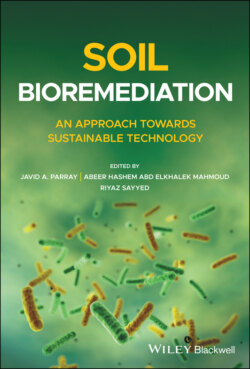Читать книгу Soil Bioremediation - Группа авторов - Страница 55
3.3.4 Laccases: Biosensors and Biofuel Cells
ОглавлениеA biosensor is an integrated biological‐component probe with an electronic transducer, thus converting a biochemical signal into a quantifiable electrical response that detects, transmits, and records information regarding a physiological or biochemical change. Some of the major attributes of a good biosensing system are its specificity, sensitivity, reliability, portability, real‐time analysis, and operation simplicity. Thus, laccases can be applied as biosensors or bioreporters [24, 25]. A number of biosensors containing laccase have been developed for immunoassays, and for determination of glucose, aromatic amines, and phenolic compounds. Laccase catalysis can be used to assay other enzymes. Laccase enzyme covalently conjugated to a biobinding molecule can be used as a reporter for immunochemical (ELISA (enzyme‐linked immunosorbent assay), Western blotting), cytochemical, histochemical, or nucleic acid‐detection assays. The bioreporter applications are of interest in the high‐sensitivity diagnostic field [25].
In addition to biosensors, laccases could be immobilized on the cathode of biofuel cells that could provide power, for example, for small transmitter systems. Fuel cells are very attractive energy sources, particularly at micro‐, mini‐, portable‐, or mobile‐scale, that potentially have higher energy conversion/usage efficiency and lower pollution effect than any of the existing or emerging energy sources [14].
